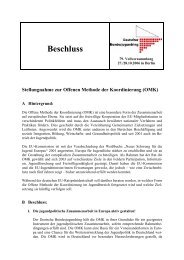6 Country Reports on Youth Work - Jugendpolitik in Europa
6 Country Reports on Youth Work - Jugendpolitik in Europa
6 Country Reports on Youth Work - Jugendpolitik in Europa
You also want an ePaper? Increase the reach of your titles
YUMPU automatically turns print PDFs into web optimized ePapers that Google loves.
In general we can state that <strong>in</strong> all countries youth work is def<strong>in</strong>ed as a doma<strong>in</strong> of ‘out-ofschool’<br />
educati<strong>on</strong> and thus l<strong>in</strong>ked to n<strong>on</strong>-formal or <strong>in</strong>formal learn<strong>in</strong>g. Only <strong>in</strong> Italy, where<br />
youth policy was traditi<strong>on</strong>ally n<strong>on</strong>-existent or reduced to dispersed local <strong>in</strong>itiatives, is youth<br />
work def<strong>in</strong>ed more exclusively <strong>in</strong> terms of the formal educati<strong>on</strong> and labour market sectors.<br />
We can see that most of the def<strong>in</strong>iti<strong>on</strong>s c<strong>on</strong>ta<strong>in</strong> two basic orientati<strong>on</strong>s reflect<strong>in</strong>g a double<br />
c<strong>on</strong>cern: to provide favourable (leisure time oriented) experiences (of social, cultural,<br />
educati<strong>on</strong>al or political nature) <strong>in</strong> order to strengthen young people’s pers<strong>on</strong>al development<br />
and foster their pers<strong>on</strong>al and social aut<strong>on</strong>omy, and at the same time to offer opportunities for<br />
the <strong>in</strong>tegrati<strong>on</strong> and <strong>in</strong>clusi<strong>on</strong> of young people <strong>in</strong> adult society by foster<strong>in</strong>g societal <strong>in</strong>tegrati<strong>on</strong><br />
<strong>in</strong> general or prevent<strong>in</strong>g the exclusi<strong>on</strong> of disadvantaged groups. Complement<strong>in</strong>g the<br />
def<strong>in</strong>iti<strong>on</strong>s with the aims of youth work, we can state that those countries that face greater<br />
problems to <strong>in</strong>tegrate their young people <strong>in</strong>to an ec<strong>on</strong>omical, residential and family-oriented<br />
<strong>in</strong>dependent life have def<strong>in</strong>iti<strong>on</strong>s that are more exclusively focussed <strong>on</strong> the socialis<strong>in</strong>g aspect<br />
of youth work.<br />
Regard<strong>in</strong>g the target groups we can state that <strong>in</strong> all countries youth work addresses young<br />
people <strong>in</strong> general as well as disadvantaged or socially excluded groups. Although there are<br />
certa<strong>in</strong>ly different priorities <strong>in</strong> general youth services and targeted services, it can be argued<br />
that the aspects of participati<strong>on</strong> and protecti<strong>on</strong> are given <strong>in</strong> all countries.<br />
Table 6: Target groups and age groups of youth work<br />
Target<br />
groups<br />
Austria Est<strong>on</strong>ia Germany Greece Ireland Italy Nether-<br />
lands<br />
All young<br />
people as<br />
well as<br />
disadvantaged<br />
and<br />
socially<br />
excluded<br />
groups<br />
All young<br />
people as<br />
well as<br />
disadvantaged<br />
and<br />
socially<br />
excluded<br />
groups<br />
All young<br />
people as<br />
well as<br />
disadvantaged<br />
and<br />
socially<br />
excluded<br />
groups<br />
All young<br />
people as<br />
well as<br />
disadvantaged<br />
and<br />
socially<br />
excluded<br />
groups<br />
All young<br />
people as<br />
well as<br />
disadvantaged<br />
and<br />
socially<br />
excluded<br />
groups<br />
All young<br />
people<br />
<strong>in</strong>cluded<br />
disadvantaged,<br />
socially<br />
excluded<br />
and regi<strong>on</strong>allymarg<strong>in</strong>alised<br />
groups<br />
Disadvantaged<br />
and<br />
socially<br />
excluded<br />
groups as<br />
well as all<br />
young<br />
people<br />
Norway Romania Spa<strong>in</strong><br />
All young<br />
people as<br />
well as<br />
disadvantaged<br />
and<br />
socially<br />
excluded<br />
groups<br />
All young<br />
people as<br />
well as<br />
disadvantaged<br />
and<br />
socially<br />
excluded<br />
groups<br />
Disadvantaged<br />
and<br />
socially<br />
excluded<br />
groups as<br />
well as all<br />
young<br />
people<br />
Age 11-25 years 7-26 years 14-27 years >30 years 10-25 years 15-36 years >23 years >26 years 15-35 years 15-29 years<br />
There are nevertheless great disparities <strong>in</strong> the def<strong>in</strong>iti<strong>on</strong> of the age groups. Indeed, each<br />
country has its own def<strong>in</strong>iti<strong>on</strong> of this span of life. While <strong>in</strong> Greece, the Netherlands and<br />
Norway the m<strong>in</strong>imum age is not def<strong>in</strong>ed, <strong>in</strong> Est<strong>on</strong>ia young people are def<strong>in</strong>ed from age 7<br />
upwards, <strong>in</strong> Ireland from age 10 upwards, <strong>in</strong> Austria from age 11, <strong>in</strong> Germany from age 14<br />
upwards and <strong>in</strong> Italy, Romania and Spa<strong>in</strong> from age 15 upwards.<br />
In the Netherlands the def<strong>in</strong>iti<strong>on</strong> of youth <strong>in</strong>cludes young people until the age of 23. In Austria<br />
and Ireland young people under 25 are <strong>in</strong>cluded <strong>in</strong> the def<strong>in</strong>iti<strong>on</strong>. In Est<strong>on</strong>ia and Norway<br />
youth is def<strong>in</strong>ed as end<strong>in</strong>g at 26, <strong>in</strong> Germany at 27. In Spa<strong>in</strong>, Greece, Romania and Italy we<br />
f<strong>in</strong>d the broadest def<strong>in</strong>iti<strong>on</strong>s, with age ranges extend<strong>in</strong>g until 29 to 36 years.<br />
The reas<strong>on</strong>s for these disparities seem to emerge from the c<strong>on</strong>cept of youth work <strong>in</strong> each<br />
country. In Greece, the Netherlands and Norway, where the idea of social <strong>in</strong>clusi<strong>on</strong> is <strong>on</strong>e of<br />
the explicit aims of youth work, children are part of the target groups of youth work. In<br />
23

















